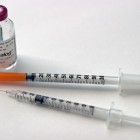Disparities
After Trials With Yale Researchers, FDA-Approved Treatment To Delay Type 1 Diabetes Brings Hope
|
The Food and Drug Administration’s recent approval of the first treatment that would delay the onset of type 1 diabetes ignited joy and hope among families impacted by the chronic, incurable disease. A clinical study found immunotherapy treatment with the drug teplizumab postponed the onset of type 1 diabetes (T1D) among at-risk children and adults for an average of two years, and for one patient, 11 years and counting. “Half the people in the study are way beyond two years,” says Yale University’s Dr. Kevan Herold, who has been working on a cure for T1D for 30 years. People with T1D have to manage the disease 24/7 or risk dangerously low or high blood sugar levels and long-term complications, said Herold, the clinical trial’s principal investigator. Before participating in a clinical trial at age 9, Claire Wirt, now 16, had antibodies that put her at risk of developing T1D within two years.


